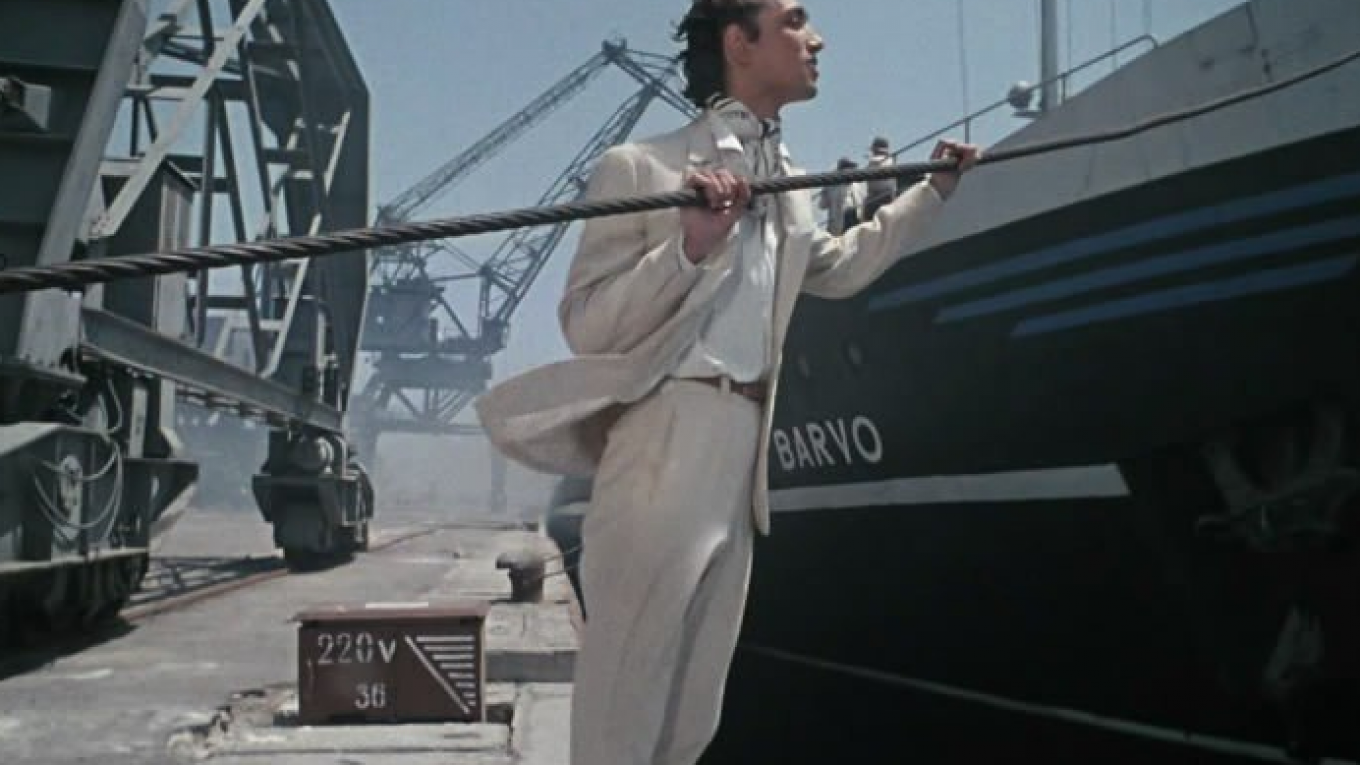Now that you’ve sobered up after the City Day festivities, Moscow television will liven things up again Monday through Friday with a Box Office Smash Week, featuring underwater derring-do, opium-chasing pirates, the country’s favorite cross-dressing Hussar and much more that Russia’s popcorn-eaters couldn’t and can’t resist. Here’s what to tune in when.
Soviet cinema critics at first dismissed Lenfilm’s “Amphibian Man” as a “third-rate genre movie” — and then hastily backtracked after 65 million ticket buyers made this exotic fantasy/romance/adventure the Soviet Union’s box office winner for 1962. Like America’s low-budget/high-concept “Creature from the Black Lagoon” (1954), “Amphibian” was an aquatic “outsider fable” that appealed to alienated-youth audiences looking for rebellious heroes. Both films work today, too, entertaining our inner teenager as they make us reflect on themes that mark a divided and chaotic world. Which people “belong” where? How “different” is that Other guy? And how many “creatures” walk among us? With this healthy food for thought, great Crimean locations and 100 million viewers in its first three years of release, “Amphibian Man” swimmingly qualifies as a Must See.
Amphibian Man Человек-амфибия. Kultura, Monday at 11:30 a.m.
Everybody likes pirate movies, and “Pirates of the 20th Century” (1979) proved that the genre knew no ideological bounds. Hailed as the Soviet Union’s first “action blockbuster,” this popcorn-eaters’ classic became the biggest ticket-seller in Soviet cinema history — and without frilly shirts, overdone eye make-up or Johnny Depp! No, this was a “modern” swashbuckler about water-borne bad guys out to heist pharmaceutical opium from a stalwart Soviet crew who defend their ship with socialist ingenuity and ferocious karate chops. The film in fact initiated a countrywide martial arts craze with what one recent critic called “groin kicking far superior to [that of] ‘Home Alone’” — so watch these mega-popular pirates wearing loose clothing, if not a black belt.
Pirates of the 20th Century Пираты XX века. Dom Kino, Tuesday at 7:00 p.m.
A hugely popular late-Soviet “musical satirical comedy,” Leonid Gaidai’s “You’ve Got to Be Kidding!” is a cinema-triptych based on three separate pieces by the classic early Soviet satirist Mikhail Zoshchenko (1894-1958). Boasting fine comic acting, well-crafted dialogue and a social piquancy rare for its time, the three plots illustrate getting arrested, getting caught out of bounds by your spouse and getting married “by accident.” The feature enticed some 50 million Soviet ticket buyers, and viewers today can see why: the situations are at once universal and peculiarly Soviet, and they are played for all they’re worth, exceeding both the bounds and laughs of most modern sit-com fare. It was heartening to see Zoshchenko cinematically “rehabilitated” well before the end of the Soviet period — he and Anna Akhmatova had been officially denounced as “alien to Soviet literature” in 1946 — so tune in and let three fine ensemble casts make you feel good as they make you laugh.
You’ve Got to Be Kidding! Не может быть! Channel 5, Wednesday at midnight.
Eldar Ryazanov’s “Ballad of the Hussars” (1962) is easily the best Soviet-produced Russian-historical-musical-comedy-romance ever made. It’s also the only entry in the genre, but that shouldn’t deter you: “Hussars” was a huge hit, remains much beloved of the Russian public and really will entertain you and anybody you’re up late with Thursday night. The film’s central conceit requires a leap of faith, but once you buy the premise that a pretty, marriageable young aristokratka can suit up in a Hussar uniform and ride off to battle Napoleon’s army without her comrades-in-arms noticing that she’s a girl, then the whole thing works like a charm. Larisa Golubkina is great as the Hussarette, and she’s matched by the versatile Yury Yakovlev as her friend and love interest and Igor Ilyinsky as the wily, vision-impaired General Kutuzov. Tune in and see what “Don’t ask, Don’t tell” meant in a 19th century Russian cavalry brigade, and whether it led to a happily ever after.
Ballad of the Hussars Гусарскaя балладa. Channel 5, Thursday at midnight.
Vladimir Bortko’s brilliant rendition of the Mikhail Bulgakov classic “The Heart of a Dog” (1988) was a shining moment in the history of Lenfilm-TV and Soviet television generally. Coming barely a year after Bulgakov’s era-defining “tragi-farcical” satire finally beat the censors and appeared in print, the film version drew huge audiences to the small screen and went on to win six awards in the Soviet Union and abroad. Natalia Bortko fashioned a screenplay both marvelously evocative and faithful to Bulgakov, while her director-husband Vladimir secured career performances from the two principals: Yevgeny Yevstigneyev as Dr. Preobrazhensky — who transplants a stray mongrel’s body parts into a stray-mongrel human and produces a New Soviet Man — and Vladimir Tolokonnikov as the transformed Chugunkin/Sharikov (Poligraf Poligrafovich), an “evolutionary” role as demanding as any in cinema. This production has been called the best filmed Bulgakov yet, and it may well be. Tune in and see comedy and tragedy mixed as only the master of Margarita’s “Master” could and the perestroika era could at length allow.
The Heart of a Dog Собачье сердце. Che, Friday at 2:45 p.m.
Mark H. Teeter is the editor of Moscow TV Tonite on Facebook facebook.com/Moscow-TV-Tonite-349389231807098/
A Message from The Moscow Times:
Dear readers,
We are facing unprecedented challenges. Russia's Prosecutor General's Office has designated The Moscow Times as an "undesirable" organization, criminalizing our work and putting our staff at risk of prosecution. This follows our earlier unjust labeling as a "foreign agent."
These actions are direct attempts to silence independent journalism in Russia. The authorities claim our work "discredits the decisions of the Russian leadership." We see things differently: we strive to provide accurate, unbiased reporting on Russia.
We, the journalists of The Moscow Times, refuse to be silenced. But to continue our work, we need your help.
Your support, no matter how small, makes a world of difference. If you can, please support us monthly starting from just $2. It's quick to set up, and every contribution makes a significant impact.
By supporting The Moscow Times, you're defending open, independent journalism in the face of repression. Thank you for standing with us.
Remind me later.







